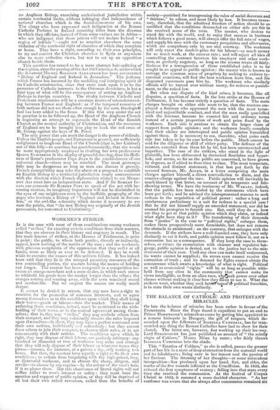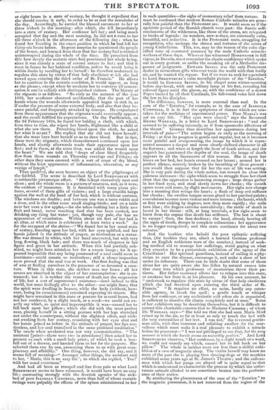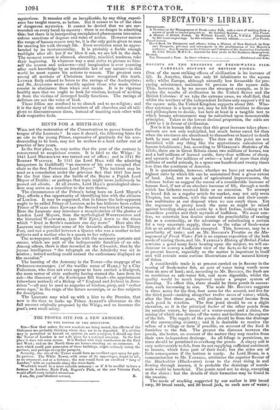THE BALANCE OF CATHOLIC AND PROTESTANT MIRACLES.
OF late the balance of miracles has been rather in favour of the Protestants. Since the Pope found it expedient to put an end to Prince HOBENLOBE'S miraculous cures by getting him appointed to a remote bishopric in Hungary, the gift of tongues, which de- scended upon the followers of ISABELLA CAMPBELL, has far tran- scended any thing the Roman Catholics have had to show for their church. The latter are, however, fast working up their lee-way. Lord SHREWSBURY has just published an account of " the saintly virgin of Caldaro," MARIA Mom, by name ; who fairly throws ISABELLA CAMPBELL into the shade.
This "Estatica of Caldaro," as she is called, passes the greater part of her life in a state ofdeep abstraction from the material world and its inhabitants ; living over in her inmost soul the passion of her Saviour. The intensity of her thoughts—or some miraculous interposition—has produced upon her hand, feet, and sides, the marks of the five wounds inflicted at the Crucifixion. In 1832, she evinced the first symptoms of ecatacy ; falling into that state every time she received the communion. At the festival of Corpus Christi in 1832, it assumed a more decided character. " As her confessor was aware that she always after communion remained six
or eight hours in a state of ecstacy, he thought it expedient that she should receive it early, in order to be at rest the remainder of the day. Accordingly, he carried the blessed sacrament to her at three o'clock in the morning : after which, she fell immediately into a state of ecstacy. Her confessor left her ; and being much occupied that day and the next morning, be did not return to her till three o'clock in the afternoon of the following day ; when he found her kneeling in the exact position in which he had left her thirty-six hours before. In great surprise he questioned the people of the house, and learned from them that her ecstacy bad continued uninterrupted during the whole of the time. He perceived from this how deeply the ecstatic state had penetrated her whole being, since it was already a state of second nature to her ; and that it Must in future be her habitual condition, unless he could bring it within limits by recalling her to herself : he therefore undertook to regulate this state by virtue of that holy obedience w:iich she had vowed upon entering the third order of St. Francis." He allows her to continue in the ecstatic condition, it would appear, as long as she pleases, except when he awakens her to converse (if conver- sation it can be called) with distinguished visiters. The history of the stigmata is as follows. "So early as the autumn of the year 1833, her confessor observed accidentally, that the part of her bands where the wounds afterwards appeared began to sink in, as if under the pressure of some external body, and also that they be- came painful, and frequently attacked by cramps. He conjectured from these appearances that the stigmata would eventually appear ; and the result fulfilled his expectations. On the Purification, on the 2d February 1834, he found her holding a cloth, with which, from time to time, she wiped her hands, frightened like a child at what she saw there. Perceiving blood upon the cloth, he asked her what it meant ? She replied that she did not know herself; that she must have hurt herself so as to draw blood. But in fact, these were the stigmata, which thenceforward continued upon her bands, and shortly afterwards made their appearance upon her feet ; and to these, at the same time, was added the wound upon the heart." We are told that "drops of clear blood frequently flow from these wounds on Thursday evenings and Fridays; on other days they seem covered with a sort of crust of dry blood, without the least appearance of inflammation, ulceration, or any vestige of lymph."
Thus qualified, she soon became an object of the pilgrimages of the faithful. The scene is described by Lord SIIREWSBURY with considerable picturesque effect. "She is kept excessively neat and clean ; and the whole room is a pattern of neatness, and, as it were, the emblem of innocence. It is furnished with many pious pic- tures, several of them gifts of visiters ; and a large crucifix hangs against the wall at the head of her bed, which is without curtains. The windows are double; and between one was a tame rabbit and a dove, and in the other some small singing-birds; and on a table near her were a few apples,—for she takes nothing but a little new fruit and bread, never touching food that has been cooked, nor drinking any thing but water : yet, though very pale, she has no appearance of emaciation. Within about six feet of her bed is an altar, at which mass is celebrated at least twice a week." -As for the occupant of the shrine—" We found her in her usual state of ecstacy, kneeling upon her bed, with her eyes uplifted, and her hands joined in the attitude of prayer, as motionless as a statue. She was dressed in white, with her bead uncovered, but with very long, flowing, black hair; and there was much of elegance in her figure and race in her attitude. When this had partially sub- aided, we might have mistaken her for a waxen image; for it ap- peared impossible that any being possessed of a soul could seem so inanimate—could remain so motionless; still a closer inspection soon proved that the soul was at work. Our first feeling was that of awe at finding ourselves in the presence of so favoured a crea- ture. When in this state, she neither sees nor hears : all her senses are absorbed in the object of her contemplation : she is en- tranced; but it is neither the trance of death nor the suspension of life, but a sort of supernatural existence—dead indeed to this world, but most feelingly alive to the other : oue might fancy that the spirit were dwelling in heaven, while the body (without, how- ever, losing its consciousness) remained expecting its return. She might have remained in this state or posture for several hours, had not her confessor, by a slight touch, or a word—we could not ex- actly say which, so quiet and imperceptible it was—caused her to fall back upon her pillow ; which she did with the most perfect ease, placing herself in a sitting posture with her legs stretched out under the counterpane, without the slightest effort, and with- out awaking from her ecstacy, remaining with her eyes shut and her hands joined as before in the attitude of prayer, her lips mo- tionless, and her soul transfixed in the same profound meditation." The oracle when awakened was not very communicative. " The assistant [priest—there were two in attendance] then asked her to present us each with a small holy print ; of which he took a box- full out of a drawer, and handed them to her for the purpose. She selected them one by one, presenting them to us with great com- placency and affability." One thing, however, she did say, and it seems full of meaning—" Amongst other things, the assistant said to her, Maria, this is an easy life '; to which she replied, Yes!' with her usual sweetness."
And had all been as tranquil and free from pain as what Lord SHREWSBURY seems to have witnessed, it would have been an easy life ; contrasting strongly with the feverish agonies of the sick- bed of poor ISABELLA CAMPBELL, more than half of whose ecstatic ravings were palpably the effects of the opium administered to her in such quantities—the sighs of momentary relief from torture. It must be confessed that modern Roman Catholic miracles are gene- rally less painful than the Protestant are. It would seem as if the agonistic period of the Romish church were past : the frantic self- combatants of the wilderness, like those of the arena, are relegated to books of legends : its wonders, now-a-days, are externally calm, beautiful, and seductive. It is the Protestant sects, struggling for recognition, who undergo the throes and tortures of the saints of young Catholicism. This, too, may be the reason of the calm dig- nified tone of command assumed by the male Catholic miracle- workers of these days. Whoever has witnessed Honstmonm in full vigour, in Bavaria, must remember the elastic confidence which spoke out in every gesture, so unlike the sneaking air of a Methodist dis- penser of judgments. EDWARD Iavixo was the only Protestant dealer in miraculous gifts who ever trode the world with that lordly air, and he wanted the repose. Yet if we were to seek for a pendant to Lord SHREWSBURY'S calm moonlight picture of the "Estatica," it would be EDWARD Iaviso, in his chapel some winter-morning before day-break, with one solitary lamp at his feet, revealing his colossal figure amid the gloom, as, with the confidence of a dozen Popes backed by all their Cardinals, his full-toned voice laid down the law to his disciples.
The difference, however, is more external than real. In the case of the "Estatica," for example, as in the case of Isensmat CAMPBELL, it is in fact the symptoms of disease which are mis- taken for the workings of supernatural power. Poor MARIA'S was not an easy life. " Her eyes were closed," says the Reverend HENRY WEEDALL, in a letter to Lord SHREWSBURY; "and she seemed to be suffering intensely, as if from spasmodic affections of the throat." GoRRES thus describes her appearance during her intervals of pain—" The action begins as early as the morning of . Friday : at first its progress is gentle and regular, but as it becomes more painful and overpowering, the image by which it is repre- sented assumes a deeper and more clearly-defined character in all its features ; and when at length the hour of death arrives, and the anguish has penetrated the depths of the soul, the image of death appears in all the lineaments of this woman. She is upon her knees on her bed, her bands crossed on her breast ; around her is perfect silence, scarcely broken by the breathing of those present : you would then suppose that for her the sun of life was setting. She is very pale during the whole action, but toward its close this paleness increases : the sighs which seem to struggle from her chest show that the oppression is becoming stronger ; large drops gather in her fixed eyes, and steal slowly down her cheeks ; the mouth opens more and more, by slight movements. Her sighs now change into a moaning that wrings the heart ; a flush of deep red suffuses her cheeks ; the swollen tongue seems glued to her parched palate; convulsions become more violent and more intense ; thehands, which at first were sinking by degrees, now drop more rapidly ; the nails turn blue; the fingers entwine convulsively; the rattle of death is heard in her throat : still, at long intervals, a few sighs seem to burst from the organs that death has stiffened. The last is about to escape ! then, the face declines ; the head, already bearing all the signs of death, droops in complete exhaustion ; her appearance is no longer recognized; and this state continues for about two minutes."
And the boobies who behold the poor epileptic suffering thus, (for boobies they are, albeit a learned German professor and an English nobleman were of the number,) instead of seek- ing medical aid to assuage her sufferings, stand gaping on what they conceive to be a pantomimic exhibition of the agony of the Crucifixion ! Her spiritual guardians, instead of calling in a phy- sician to cure the disease, encourage it, and make a show of her under its influence. There can be little doubt that some of those about her arc quite aware she has fallen by natural causes into that state into which professors of mesmerism throw their pa- tients. Her father confessor allows her to relapse into this state, or awakens her from it, at his pleasure. By his own account, he " undertook to regulate this state by virtue of that holy obedience which she had received upon entering the third order of St. Francis." " It requires no effort, no noise, hardly any osten- sible agency, to break the spell : a gentle touch or whisper from her confessor, or any ecclesiastic with whom she is acquainted, is sufficient to dissolve the charm completely and at once." Some of her exhibitors may be deceiving themselves, but it is difficult to extend this charitable construction to Madame CRASSER ; of whom Dr. WEEDALL says—" She told me that she had seen Maria Moil raised up in the air, as far at least as only to touch the bed with the very extremities of her feet. I was not," the reverend gentle- man adds, with that immense and relishing swallow for the mar- vellous which must make it a real pleasure to exhibit a miracle before its possessor—" I was not privileged to see that, but the very manner in which she kneels seems an unearthly position." And Lord SHREWSBURY observes, "Her confessor, by a slight touch or a word, we could not exactly say which, caused her to fall back on her pillow." The whole is neither more nor less than a skilful exhi- bition of a case of magnetic sleep. The victim herself may know no more of the part she is playing than dancing-dogs or the monkies exhibited some years ago at St. James's Theatre ; and the callous- ness with which her pangs are played off is quite equal to that which is understood to characterize the process by which the unfor- tunate animals alluded to are sometimes beaten into the perform- ance of their antics.
By attributing the phlenomena of the case of the "Estatica" to the magnetic possession, it is not removed from the region of the mysterious. It remains still as inexplicable, by any thing experi- ence has taught reason, as before. But it ceases to be of the class of dangerous mysteries. It cannot be denied that we are sur- rounded on every hand by mystery : there is no danger in admitting this; but there is in interpreting unexplained pluenomena into mira- culous sanctions of dogmas and rules of action. However narrow the range of human reason may be, it is the only guide given to man for steering his walk through life. Even revelation must be appre- hended by its instrumentality. It is probably a feeble enough rushlight after all: but if we blow it out, we are left in the dark. The moment reason is silenced, absurdity, mischief, madness, take their beginning. In whatever way a man strive to picture to him- self the unseen and unknown—and imagination is ever yearning after such knowledge by an irresistible law of our nature—in this world he must square his actions to reason. The greatest men among all sections of Christians have recognized this truth. LUTHER flatly refused to listen to the ravings of the Anabaptists ; and ST. Annusms wrote sturdily against those who made virtue consist in abstinence from wines and meats. It is to vigorous healthy men that we ought to look for wisdom, instead of seeking it from the victims of deranged bodily functions. The ravings of delirium are not the voice of God.
These follies are confined to no church and to no religion ; and it is the duty of the rational members of all churches and all reli- gions to discountenance them, instead of taunting each other with their respective fools.




























 Previous page
Previous page